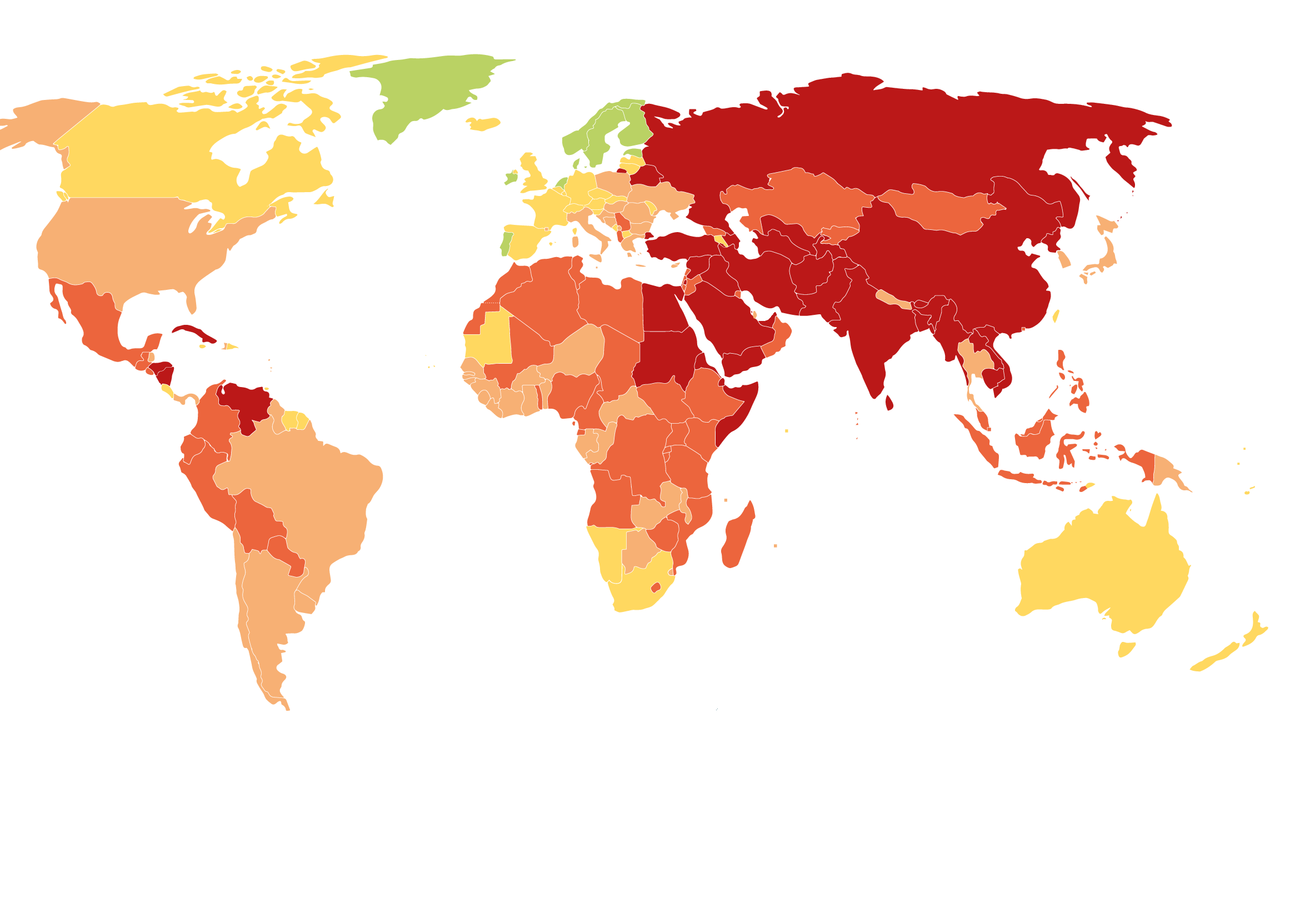- Middle East - North Africa
- Countries
- Press releases
- Take action
The 2024 press freedom ranking’s political indicator is in free fall in most of the region’s countries, as authorities pursue their attempts to control the media by every possible means, including violence, arrests, draconian laws, financial pressure or manipulation of societal norms – all this compounded by systematic impunity for crimes of violence against journalists.
Region at war
Wars are killing journalists in the region. Palestine (157th), the most dangerous country for reporters, is paying a high price. The Israel Defence Forces (IDF) have so far killed more than 100 journalists in Gaza, including at least 22 in the course of their work. Since the start of the war, Israel (101st) has been trying to suppress the reporting coming out of the besieged enclave while disinformation infiltrates its own media ecosystem. Overtaken by Qatar (84th), Israel has lost its number 1 position in the region and the classification of its press freedom situation has gone from “problematic” to “difficult”. The IDF also killed three journalists in Lebanon (140th).
A civil war since April 2023 has killed several journalists in Sudan (149th), where the press freedom situation is now classified as “very serious”. Syria is now second from last in the Index as a result of falling four places. Although it is one of the world’s most dangerous countries for media personnel, Syrian journalists who fled abroad are threatened with expulsion from Jordan (132nd), Türkiye and Lebanon.
Journalists jailed, political pressure
The region’s governments have spared no effort to tighten curbs on the right to information, using every kind of surveillance in the Persian Gulf, planning restrictive and draconian legislation in Kuwait (131st) and Lebanon, or already promulgating it in Jordan and Algeria (139th), where independent media are on the verge of disappearing altogether.
Four of the world’s ten biggest jailers of journalists are in the Middle East. They are Israel, Saudi Arabia (166th), Syria and Iran (176th), which – with its mass imprisonment policy – holds on to its extremely low ranking. The release of a few journalists in Egypt (170th), thanks above all to international pressure, and of journalists held hostage in Yemen (154th), as a result of reconciliation between Iran and Saudi Arabia, confirmed the degree to which political interests influence journalists’ safety.
Journalists are subjected to pressure from politicians in all countries in the region and often pay a high price for political polarisation, as in Iraq (169th). In Tunisia (118th), reporters who criticise the president's hold on power since 2019 are arrested and questioned, in a reminder of practices prevailing in the pre-revolution era.
Authorities increasingly impose red lines dictating how certain subjects should be covered or banning coverage altogether. What with war, corruption, financial crimes, economic crises, feminism, migrants, ethnic groups and sexual minorities – the range of subjects that the Middle East’s media are not “authorised” to cover keeps on growing.
Morocco (129th) is the only country that saw a rise in its political indicator, but the rise was due to the absence of new arrests. The scale of the persecution of journalists, especially judicial persecution, remains unchanged in Morocco.
Countries
| Name | Index | Global score | Diff. score 2023 | Diff. position 2023 |
|---|---|---|---|---|
Algeria
|
139
|
41.98
|
-4
|
3
|
Saudi Arabia
|
166
|
27.14
|
-5
|
-4
|
Bahrain
|
173
|
23.21
|
-7
|
2
|
Egypt
|
170
|
25.1
|
-8
|
4
|
United Arab Emirates
|
160
|
30.62
|
-12
|
15
|
Iraq
|
169
|
25.48
|
-7
|
2
|
Iran
|
176
|
21.3
|
-3
|
-1
|
Israel
|
101
|
53.23
|
-4
|
4
|
Jordan
|
132
|
44.3
|
2
|
-14
|
Kuwait
|
131
|
44.66
|
6
|
-23
|
Lebanon
|
140
|
41.91
|
-9
|
21
|
Libya
|
143
|
40.59
|
0
|
-6
|
Morocco / Western Sahara
|
129
|
45.97
|
2
|
-15
|
Oman
|
137
|
42.52
|
5
|
-18
|
Palestine
|
157
|
31.92
|
-6
|
1
|
Qatar
|
84
|
58.48
|
3
|
-21
|
Syria
|
179
|
17.41
|
-10
|
4
|
Tunisia
|
118
|
49.97
|
-1
|
-3
|
Yemen
|
154
|
33.67
|
1
|
-14
|





